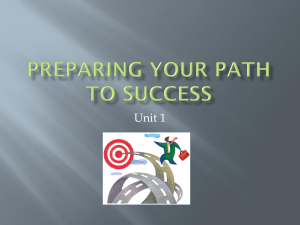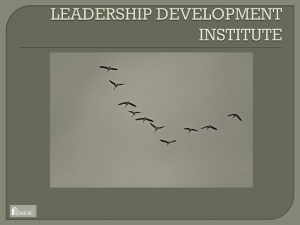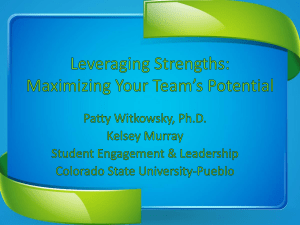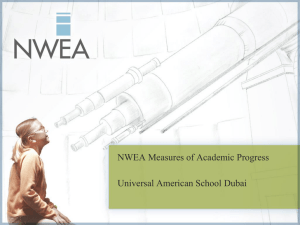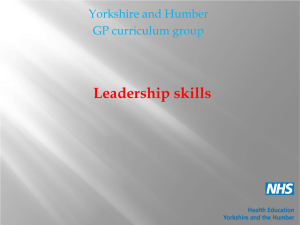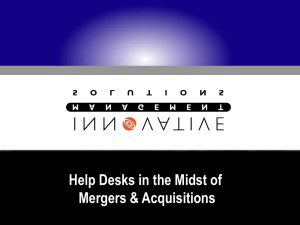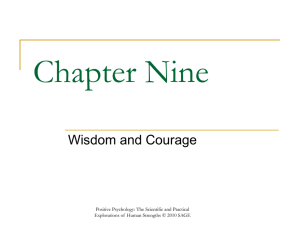The Effective Executive
advertisement
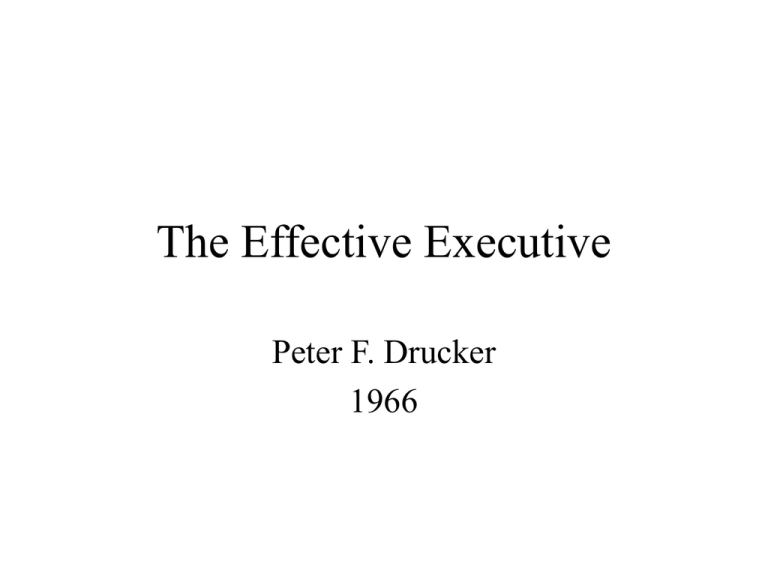
The Effective Executive Peter F. Drucker 1966 Effectiveness • Executive must manage themselves for effectiveness if they expect others to follow • Intelligence, hard work and knowledge are not enough, others must use our output (results) • Effectiveness often goes opposite the flow of events • Effective results always external impact • Survival of the organization depends on producing the maximum contribution with the minimum of effort • Focus on maximum contribution imposes relevance on events. • To focus on contribution is to focus on effectiveness It Can Be Learned • Don’t do things right, do the right things • Effectiveness converts intelligence, imagination and knowledge into results – can’t be measured by traditional metrics – works from changes in trends not from events – others must make use of what we contribute • Efficiency (manual work) do things right – Not applicable to knowledge work – There are no results within an organization – Organizations are measured by their contribution to outside world – Need for resources grows with the cube of the size 5 Practices • • • • • 1) Know where time goes 2) Focus on results, not effort 3) Build on strengths (Grant) 4) Do what counts (Priorities) 5) Make effective decisions (page 24) – Judgement based on “dissenting opinions” – Focus on a few right strategies – Minimize razzle-dazzle tactics Time • • • • • • • • • • • Record it Manage it Consolidate it This is the ultimate finite limiting factor Memory is not an accurate way to record time It takes a long time to make people decisions (1 year) Time in long continuous uninterrupted units is needed to decide who to group for problems (1st Year) The more physical work you want to eliminate the more mental work you must do Recurrent crisis is laziness Don’t overstaff Don’t have too many meetings Results • • • • • • • • • I must make a significant contribute to the positive external results of my organization. What is the unused potential in my job? I must produce knowledge, ideas, information and concepts. The must make my specialty useful. I must take responsibility for being understood I must be sure to provide that which others need A “generalist” is a specialist that is universally understood. It is the focus on “contribution” that leads to the communication that creates synergy. Effective work comes from the discipline necessary to blend diverse knowledge into a collective success Effective Meeting • • • • • • • Why are we having this meeting Decision? Inform? Increase Focus? What is the purpose and contribution You can listen and direct a meeting You can take part You can’t do both!!!!!! Always focus on the expected contribution Strengths are Opportunities • Unified strengths make individual weaknesses irrelevant • Staff to maximize strengths – “Find out what Grant is drinking and send a barrel to the other generals” Lincoln – “Here lies a man that who knew how to bring into his service men better than he was himself” epitaph for Andrew Carnegie • Design jobs that are doable, demanding and large – must have enough challenge to bring out undiscovered strengths • Start with what they can do rather than what the job requires • Lead from personal strengths First Things First • • • • • • • • Do one thing at a time Executives not pressure should make the decisions We often abandon that which we postpone Achievement does not depend on ability, it depends on the courage to go after the opportunity. Set your priorities by opportunities presented not by the likelihood of quick success. It is just as risky to do something small and new as it is to do something big and new Concentration - the courage to impose decisions on time and events Focus on the completion of the one task now and let the situation to decide what is next Decision Making • The specific executive task • Effective executives make effective decisions • Effective executives concentrate on the important decisions – The decision is strategic – The decision is based on abstractions at the highest level of conceptual understanding – The decision leads to real, effective simple action – The decision is based on a few important variables – The decision is sound and makes a real impact Elements of the Decision • • • • • Is the problem the symptom or the disease Bound the decision – Most difficult step – Exercise in judgement – Even wrong decisions should fill boundary conditions – 1/2 loaf and 1/2 baby one fills boundary conditions What is right verse what is acceptable – postpone the compromise until the end Built in Action – most time consuming – who needs to know, what action, by who Feedback Effective Decisions • • • • • • • • • • • • • Decision is a judgement Balance between “Almost right” and “Probably Wrong” Right decisions grow out of the clash and conflict of divergent opinions Right decisions grow on the consideration of competing alternatives Events are not facts, we must have a criterion of relevance People always start with an opinion Most look for facts that already fit the conclusions that they have reached. Traditional measurements are often not the right measurements Look for different ways to measure success. Don’t make a decision until there is disagreement. The right decision demands adequate disagreement. Disagreements is the birth of alternatives Disagreement is needed to stimulate the imagination Effective Decisions • • • • Not going to be pleasant Not going to be popular Not going to be easy Decision making takes as much courage as it does judgement • The cry of the coward “Let’s make another study” • Decisions on the operating level are adaptations and require no real knowledge. Effectiveness Must be Learned • • • • • Record your time Focus on your contribution Move forward based on your strengths Do first things first Make effective decisions

